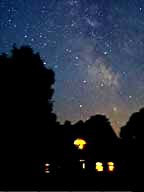
City dwellers usually notice what they miss from the
night sky when they go to the country side where there is no glare of city
lights that obscure the stars. ‘Light pollution’ has increasingly become a
concern and activists and scientists are taking up the cause.
Many believe the profusion of light is taking a great toll on us. This has
sparked a new science, scotobiology, the Biology of Darkness. The theory is that
plants, animals, and humans are programmed to function in a certain rhythm of
daylight and darkness. If we alter it, unhealthy things happen.
Advocates have launched a dark skies movement worldwide to reduce light
pollution in cities, and in Canada, some cities including Toronto has set up a
committee to examine the issues and solutions. The goal is to reduce the side
effects of light pollution and to create a balance between necessary urban light
levels and a healthy environment. There are even dark sky reserves, where
artificial light is controlled or banned.
Light pollution is caused by too much and badly designed lighting, where light
is scattered in all directions, rather than where it is intended. As a result,
more light is poured into the sky and energy is wasted.
Advocates have used the biological side effects or economic benefits to promote
the cause of the darkness movement, e.g. weakened immune system for humans, or
effects of wasted energy on the environment. These are valid concerns. However,
from a philosophical view point, most importantly, a dark sky gives us access to
the stars. When there is no light pollution, we are always amazed at the
immensity of the night sky, the sense of awed that it provokes. A starry sky
allows us to see the grandeur and majesty of the universe, and above all, the
mystery of the universe, and that we are connected to it.